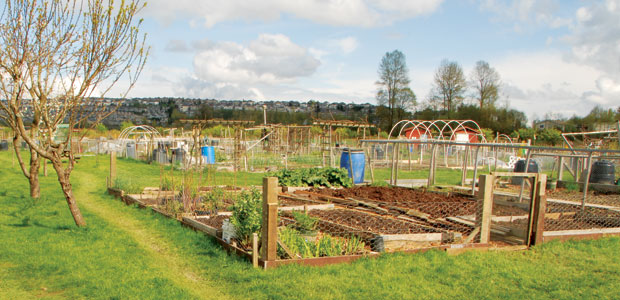Advertisement
Tilling Togetherness
Hot town! It’s time to shake off the dust, bust out of your tiny-but-affordable apartment, and join the steamy chaos of summer in the city! Wind your way through hot dusty streets, twine through crowds of strangers on their way to everywhere, veer off the concrete sidewalk onto the grassy field, and breathe deeply–you’ve reached … Continued

Hot town! It’s time to shake off the dust, bust out of your tiny-but-affordable apartment, and join the steamy chaos of summer in the city!
Wind your way through hot dusty streets, twine through crowds of strangers on their way to everywhere, veer off the concrete sidewalk onto the grassy field, and breathe deeply–you’ve reached your garden sanctuary.
There are others working on gardens, and you stop to note the progress of their produce. A friend gives you that bag of compost they promised, you say “thank you very mulch,” and then turn your attention to your herbs.
Small Idea–Big Impact
Those tiny herbs will have a global impact on climate change. The David Suzuki Foundation reminds us that “a basic North American meal travels 2,400 km from field to table—roughly the driving distance from Regina to Toronto!” This puts a tremendous strain on the earth’s resources.
Furthermore, the process of growing and harvesting food once brought the community together. During the First and Second World Wars, resources were scarce and citizens struggled to attain a sense of well-being. This is when the idea of community gardens first sprouted.
Plant the Seeds
To start your own community garden, you’ll need to find out where you can rent an allotment. Check the Internet for nearby locations or better yet, ask around in the community. Local gardening stores should be able to point you in the right direction.
Startup costs for the garden are very reasonable. Renting a small allotment for the summer costs around $10 to $20 (up to $50 for large ones), and some are free if you put in a few
volunteer hours on the grounds. Beyond that, all you need are seeds and some basic tools.
In the end, among all the countless benefits to growing a community garden, participants will enjoy a hefty supply of fresh produce for the summer, and both the city and the planet will be a greener place to live.
There are countless reasons why urban gardens are the perfect platform on which to build a healthy, self-sufficient community.
- Gardening simply puts people in a good mood.
- The fresh air, the daily physical activity, and the evidence of ongoing accomplishment provide many gardeners with a sense of satisfaction and well-being.
- It’s a great opportunity for children to learn about food and the earth by helping with planting, weeding, and harvesting.
- Gardening is known to stimulate the senses, making it the perfect activity for many elderly people.
- Accommodations such as hanging baskets can be made for those who are differently abled.
Many people find a group of like-minded friends to share in the cost, work, and fun of growing a garden.
- Work together to decide what vegetables, fruits, herbs, or flowers you want in your garden.
- Decide whether or not to go organic and what growing methods you wish to use (raised bed, companion planting, biodynamic, etc.).
- It’s also a good idea to develop a work-share plan so every participant knows their role.




